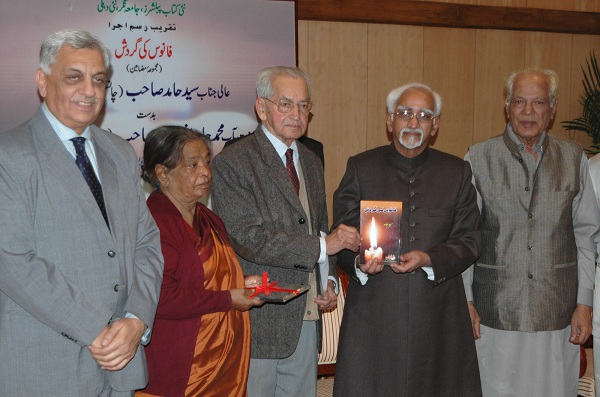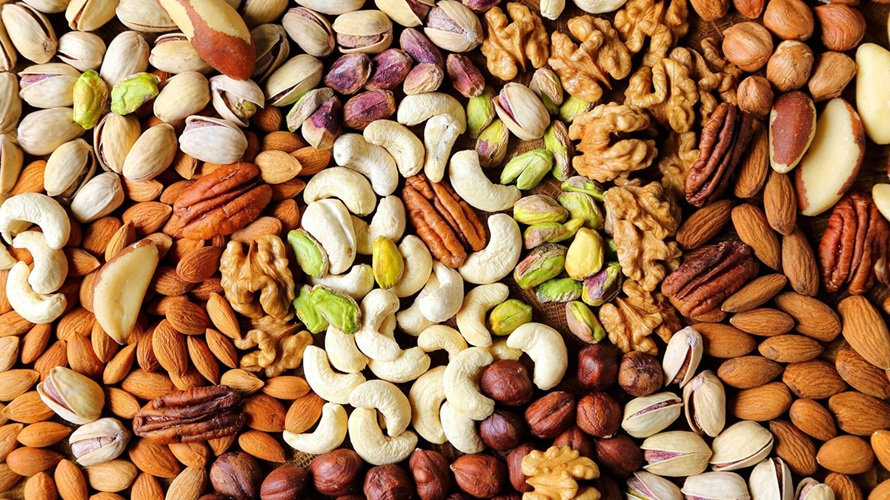
Janab Saiyid Hamid’s demise has shocked the entire Muslim India. Despite huge difference of age between him and me, he was immensely fond of me. Whenever I invited him to Saharanpur, he always obliged. In 2001, when I invited him to delivere the Keynote Address in National Seminar on Family Health, he spoke words about me that made me feel humbled to the point of embarrassment. I was just around 40 then, and he was double my age. He said that “I came to Saharanpur because I have aqueedat for Javed Jamil”. I didn’t feel elated because he spoke such words for me, but I had tears in my eyes feeling the greatness of his character. This was indded great of him because in today’s world, people are extremely reluctant toadmire contemporaries or juniors. I never saw a man more humble and m ore pure-hearted than him. He not only foreworded my book, “The Essence of the Divine Verses” in several pages, but also organised the release ceremony with Former Prime Minister, Mr I K Gujaral, Mr Rajendra Sachar, Maulana Wahiduddin Khan, Maulana Akhlaq Husain Qasmi attending. Around 5 years back, I had published an interview of him in my magazine. I am reproducing the interview below.
Dr. Javed Jamil
Whenever and wherever Saiyid Hamid’s name figures, it invariably invokes a kind of respect that is extremely rare in the current world. A former administrator and present Chancellor of Jamia Hamdard, Hamid is most known as Former Vice Chancellor of Aligarh Muslim University. AMU wields such a huge influence in Muslim India that whoever holds its reins as Vice Chancellor instantly becomes a revered figure. But he is also a soft target of attack, as different interest groups are always ready to pounce at him, if they find him deviating from the path they have chosen for him. Saiyid Hamid was no exception. He had to face both banquettes and brickbats for his endeavours to reform the campus. This goes to his credit however that with the passage of time banquettes outsmarted brickbats. In fact, he became increasingly more popular and respectable after he left AMU, as people had begun to realise the importance of his reforms. His personal integrity, devotion to his purpose of life, dedication to the uplift of Muslim community, conscious distancing from political arena and its gullibility, his wholehearted support and guidance to educational and socially beneficial activities and his sophisticated ways in dealing with the people, all have made him a fatherly figure for Indian Muslims. And now when he is about to become a nonagenarian (Insha Allah), the biggest tribute to his lifelong discipline and dedication is the fact that in his own words “For last 65 years, I have been following the same routine from the morning till night that comprises rising early in the morning, going for a decent walk, joining the office at about 10 and working in the office till 5 and returning back.” When this writer walked to his room to have a conversation with him, the 90 year old Hamid Sahib looked as handsome, as alert and as meticulous as ever, with a smile that had the innocence of a child of not more than 9. When he started talking, his voice demonstrated the same remarkable discipline that has marked his whole life. He spoke in a measured tone with mathematical precision in ups and downs, and pauses and stops. The words poured from his lips like the drops of sweet smelling rain. And of course, the literary flourish that has been the hallmark of his speeches and writings was there in full display.
When this writer asked him which of three of his major positions—an administrator, VC of Aligarh Muslim University and educationist, he values most, he told that his two five year terms at AMU were the most valuable part of his life. He said:
The first half of second coming was tempestuous. It put my endurance and resilience to test and gave moments brimful with danger and nerve-wrecking experiences. I know that those disturbances could have been avoided. But I don’t regret the disturbances because disturbances are bound to occur whenever there are attempts to reform a system in a big way. There are always interest groups that would do everything in their power to derail the reforms.
“From the two spans of 5 years each, the first one (1937-42) ushered in my career and I benefited thoroughly from the faculties and academic wherewithal provided by the university. The second 5 year term was important because it gave me an opportunity to pay back to my alma mater what it had given to me in the form of selection for an administrative career of 35 years, the experience of which greatly helped me in serving the university. The first half of second coming was tempestuous. It put my endurance and resilience to test and gave moments brimful with danger and nerve-wrecking experiences. I know that those disturbances could have been avoided. But I don’t regret the disturbances because disturbances are bound to occur whenever there are attempts to reform a system in a big way. There are always interest groups that would do everything in their power to derail the reforms. The tenure of Prof. Aleeem before me was full of chaos. The university had become a hotbed for the undesirable elements. Prof Khusrau had a charm about himself and he was a great economist and an equally great conservationist. The charmer that he was, he was popular among students. But unfortunately his popularity became his weakness, as he did not try to challenge the unruly elements. In short, the period before my arrival was marked by a sort of laissez faire. Nawab Yawar Jung was in fact attacked by riotous students. When Prof Khusrau relinquished the office, a temporary arrangement was made for 6 months. This interregnum proved disastrous and there was pandemonium on the campus. When I took the assignment, in my very first address to students I told them that thence forward the university will be managed according to laws and regulations by the duly constituted authority and the student leadership must restrict itself matters of moment to it such as academic excellence, exams and admissions at the scheduled times and maintenance of discipline. This was not relished by students The hostels were occupied by unauthorised elements. And they now knew though would have to vacate them. There were disturbances in first two years. The university had to be closed twice. Instead of succumbing to pressures, I remained firm and tried to reach the parents whose support ultimately helped me a lot in restoring the order. I could put into practice the hard reforms that were essential if the university was to return back to its lost glory. While the political leaders had supported the students leaders against me, I have the satisfaction that Ulama and the parents wholeheartedly supported me. And I will also remain grateful to Madam Indira Gandhi whose appreciation of my efforts was a big boost to me in carrying out the reforms. I ultimately succeeded in getting rid of the criminal elements and putting back the focus on academics and merit. Another step that I took was to serve notice to those teachers that had joined services abroad and were on extended leave. I gave notice to them to return within a specified time and terminated those who did not comply. I also saw that several heads of departments had become virtual tyrants. I took the issue to EC and suggested tenure of not more than 5 years for heads. This proved to be an unpopular step but those who recognised its importance hailed it as a step as important as Zamindari Abolition Act”
Prof Khusrau had a charm about himself and he was a great economist and an equally great conservationist. The charmer that he was, he was popular among students. But unfortunately his popularity became his weakness, as he did not try to challenge the unruly elements. In short, the period before my arrival was marked by a sort of laissez faire. Nawab Yawar Jung was in fact attacked by riotous students. When Prof Khusrau relinquished the office, a temporary arrangement was made for 6 months. This interregnum proved disastrous and there was pandemonium on the campus. When I took the assignment, in my very first address to students I told them that thence forward the university will be managed according to laws and regulations by the duly constituted authority and the student leadership must restrict itself matters of moment to it such as academic excellence, exams and admissions at the scheduled times and maintenance of discipline.
By the time Saiyid Hamid left the AMU, he had already earned the respect of the community all over the country. His firmness in dealing with difficult situations and his personal integrity had endeared him to those who had the ability to recognise the jewels. Hakeem Abdul Hameed had the farsightedness to understand without any delay that Saiyid Hamid was too important a man to retire or hold some position that might look big but would not have any long term benefits. He brought him to Hamdard which needed a person at the helm of affairs who can successfully guide it to its destination. And for Hamid himself, nothing could be a better choice than to help the cause of education. Soon the combination of the great Hakim and the great Visionary saw the emergence of a new Muslim institution that was on way to become a university. It has already become a deemed to be university. Hamid’s admiration for Hakim Sahib is therefore natural. He says: “There are at least two events that separate Hakim sahib from the crowd. When every educated Muslim was looking to find a way to Pakistan in the immediate aftermath of Partition, and even his brother had left India, Hakim Abdul Hamid was searching for a piece of land in Delhi for establishing an institution. He had the love for his homeland and the farsightedness to see that his community would require special efforts for education.” Saiyid Hamid paid rich tributes to Hakim sahib, “He may not have been a big scholar but he had remarkable vision. He developed a big pharmaceuticals from a very small shop where a few compounders worked. Now Hamdard is the biggest name in Unani medicine. He did not stop at that. While Sir Syed and others begged to establish institutions, Hakim Sahib established the university on his own.”
Hakeem Abdul Hameed had the farsightedness to understand without any delay that Saiyid Hamid was too important a man to retire or hold some position that might look big but would not have any long term benefits. He brought him to Hamdard which needed a person at the helm of affairs who can successfully guide it to its destination. And for Hamid himself, nothing could be a better choice than to help the cause of education. Soon the combination of the great Hakim and the great Visionary saw the emergence of a new Muslim institution that was on way to become a university.
While remaining Chancellor of Jamia Hamdard, Saiyid Hamid made significant contributions to education and social reform in Muslim community. One of his most remarkable achievements was the establishment of Hamdard Study Circle that conducted special coaching classes for civil services. These coaching classes have led to significant increase in the number of Muslims selected for IAS, IFS, IPS and allied services. He has also led several caravans including Taleemi, Insaaf, Islah-e Maashaah caravans that effectively carried the messages of education, justice and social reforms to the masses across the country.
Saiyid Hamid has also been a guiding force behind a number of institutions that have been established in last two decades. He has also been a source of encouragement for all those who have been serving the community at different levels. When asked about the persons whose work had impressed him most, he said: “There are quite a few names. The most noteworthy has been in my view Dr Mumtaz Khan, Founder of Al-Ameen Movement. His achievement is admirable not only because his movement led to the establishment of more than one hundred institutions including Medical, Engineering and medical colleges but also because he has been able to produce second and third generations of dedicated workers. Then Mr Ghayasuddin Babu has also done some remarkable work in the rural areas of Andhra Pradesh. Other important achievers include Mr Inammadar of Pune, Mr Israel of Gurgaon, Dr Ahmad Abdul Hai of Patna and Azam Complex builders.” He said that there are many other significant movements that can be counted and “it is amazing to see that medical doctors have been doing some excellent work in different fields.”
And of course, Saiyid Hamid himself remains the most revered figure for all of them. Fewpeople know that Saiyid Hamid was also a keen sportsman of his time, with Hockey being his favourite game. In addition he has also excelled in Urdu poetry. His following shair sums up the pain he has in his heart, body and soul – the pain of the failures of his community and the pain of the problems of the world.
“Eik do zakhm nahi(n) jism hai saara chhalni (There are not just one or two wounds; the whole body has become a sieve)
Dard baichara pareshaa(n) hai kaha(n) se utthe (The poor pain is anxious not knowing where to arise from.)
· Dr Javed Jamil is India based thinker and writer with over a dozen books including his latest, “Quranic Paradigms of Sciences & Society” (First Vol: Health), “Muslims Most Civilised, Yet Not Enough” and “Muslim Vision of Secular India: Destination & Road-map”. Other works include “The Devil of Economic Fundamentalism”, “The Essence of the Divine Verses”, “The Killer Sex”, “Islam means Peace” and “Rediscovering the Universe”. He can be contacted at doctorforu123@yahoo.com or 91-8130340339. For his shayri visit http://urduyouthforum.org/shayari/poet-Dr-Javed-Jamil.html






0 Comments